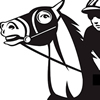Blinkers Off Tall tales from the Derby's past
From Seabiscuit to Blind Vanity
They call it Derby Fever. It freezes the mind and leaves it devoid of logic. There is no cure. It afflicts hedge fund managers, captains of industry and self-made men and women who were tough enough and smart enough to build multimillion-dollar industries.

Charles Howard and Seabiscuit (Wikimedia Commons)
It is the kind of affliction that convinces the owners of thoroughbred horses that possess the speed of herniated snails to order a trainer to make them Derby qualifiers. It makes brilliant men stupid, and it comes back to bite them without concern for race, creed or gender.
Vanity has long been its silent partner.
It gets its name from what is clearly America’s horse race, but it doesn’t just live within the borders of Churchill Downs.
In 1937, War Admiral won the Kentucky Derby, a race in which a horse named Seabiscuit was not entered. A year later, Seabiscuit beat War Admiral in a thrilling and famous winner-take-all match race. History has portrayed War Admiral’s owner/breeder, Samuel Riddle, as at least as arrogant as Napoleon. Consequently, after the match race victory, Seabiscuit’s owner, Charles Howard, believed that in all matters of horse racing he was a latter-day Delphic Oracle.
After all, he beat the Derby winner. Instead of Derby Fever, Howard’s affliction morphed into the terminal disease called invincibleitis.
Now, here was a guy who was king of all of Northern California’s Oldsmobile and Buick dealers. His super horse raced so many times in so many places they called him Marco Polo. Seabiscuit often went from his private railroad car to the track, to the winner’s circle and back to the train. He was a wonder horse purchased for a measly $8,500 that Howard turned into an equine dynasty.
You would think, therefore, that this was no wide-eyed mark at a street-corner three-card monte game. You would think he would have a mind like a steel trap, a heart of stone and a psyche that could never be conned.
And you would think that a man with a farm that was a showplace in California’s Mendocino County, that owned a fashionable box at Hollywood Park and held overpowering stature in the jockey club that made his influence first among equals could never be beaten by a group of cowboys whose boots smelled of what is always left behind when horses go before.
You would be thinking wrong.
In his search for speed to breed he bought an English sprinter named Fair Truckle, from the sire line of Phalaris, a pre-eminent influence on the breed the world over. On the day Howard first raced Fair Truckle at Hollywood Park, a strange, bowlegged cabal descended on the track and worked its way toward his private box.
Unbeknownst to Howard, the plot was now in motion. It was laced with greed, fueled by intrigue and triggered by Howard’s blind vanity. Throw in a band of grifting cowboys from Arizona and Texas, who looked as though they had wandered off the set of “Lonesome Dove” and add a mean-spirited quarter horse with the killer instincts of a junkyard dog.
Keep in mind Fair Truckle was a really nice horse.
The Chuck Wagon Cabal swarmed the aisle leading to Howard’s box. When Fair Truckle came on the track, the gang hooted and jeered and fanned their cowboy hats. Then one of its members hollered over at Howard, “What is that thing? Cain’t be a hoss.”
An usher with a nose for a potential tip when he smelled one raced over and offered to chase them away. Before Howard could respond, the ringleader moved in close and challenged, “We got a quarter horse named Barbara B that can beat that pampered darlin’ of yours and leave him for dead at 440 yards. Wanna bet?”
The hook was set.
“How much?”
“Waal, ah reckon we could raise 50.”
“Fifty?” Howard snorted. “You want me to bet you 50 dollars?”
“No, sir. We wuz thinking more like 50 thousand dollars.”
The man who defeated the great War Admiral could only see his own truth, but he still managed to lay down conditions to protect his thoroughbred… or so he thought.
“Starting gate,” he said, ticking off the rules. “Jockeys wear silks. We race here next week after the track’s current meeting ends. No public admission. Money truck at the finish line holds the stakes, and I want to see your money the morning of the race.”
No public admission? The word spread like a California wild fire. On Aug. 19, 1947, hundreds stormed the track and spilled throughout the grandstand. There the Chuck Wagon Cabal greeted them, at the ready to expand the realm of suckers in their midst, offering to take their bets mano-a-mano as well.
Fair Truckle was already on the track. The great Johnny Longdon, Howard’s contract rider, was aboard. Then all heads turned toward “it.”
There may have been uglier horses within sight of Hollywood Park that summer, but if there were, they were pulling ice wagons. Up in the saddle was a jock that had been banned in every bullring racetrack in the Southwest, Mexico and probably as far away as Greenland.
He wore spurs as fine as knitting needles.
Howard began to scream.
“Your rules, Mr. Howard,” the men told him. “Don’t see nothing in them about who rides what. Don’t see nothing in them about no spurs.”
One kick out of the gate and Barbara B led from start to finish. She won it by a clear length.
Howard did not ask for a rematch, but, as the Derby each year shows, the lessons in vanity from others are not always learned.
 Working from Churchill Downs undercover, Blinkers Off is a legendary, award-winning sports writer spinning tall tales from Derbies past. More by
Working from Churchill Downs undercover, Blinkers Off is a legendary, award-winning sports writer spinning tall tales from Derbies past. More by 
